- Regulatory Status
- RUO
- Other Names
- Small inducible cytokine subfamily B, member 8 (SCYB8), Monocyte derived neutrophils chemotactic factor (MDNCF), Neutrophil-activating peptide 1 (NAP1), Granulocyte chemotactic protein 1 (GCP1), Chemochine, CXC motif, ligand 8, CXCL8
- Ave. Rating
- Submit a Review
- Product Citations
- publications
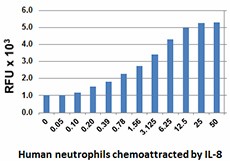
-

Bioactivity was measured by its property to chemoattract human peripheral blood neutrophils in a dose dependent manner with an ED50 = 1 to 5 ng/ml.
IL-8 (CXCL8) was originally recognized as a neutrophil-activating protein on the basis of two in-vitro effects, chemotaxis and the release of granule enzymes. IL-8 is generated as a precursor of 99 amino acids. Once the mature cytokine is secreted, the amino-terminal is processed to yield several biologically active variants. The predominant variant consists of 72 amino acids. IL-8 is one of the ELR (Glu-Leu-Arg) motif-positive CXC-chemokines and shares similarities with angiogenic cytokines.
Product DetailsProduct Details
- Source
- Human IL-8, amino acids Ser28-Ser99 (Accession # NM_000584) was expressed in E. coli.
- Molecular Mass
- The 72 amino acid recombinant protein has a predicted molecular mass of approximately 8385 Da. The DTT-reduced protein migrates at approximately 8 kD and the non-reduced protein migrates at approximately 10 kD by SDS-PAGE. The N-terminal amino acid is Serine.
- Purity
- >95%, as determined by Coomassie stained SDS-PAGE
- Formulation
- 0.22 µm filtered protein solution is in PBS
- Endotoxin Level
- Less than 0.01 ng per µg cytokine as determined by the LAL method.
- Concentration
- 10 and 25 µg sizes are bottled at 200 µg/mL. 100 µg size and larger sizes are lot-specific and bottled at the concentration indicated on the vial. To obtain lot-specific concentration and expiration, please enter the lot number in our Certificate of Analysis online tool.
- Storage & Handling
- Unopened vial can be stored between 2°C and 8°C for up to 2 weeks, at -20°C for up to six months, or at -70°C or colder until the expiration date. For maximum results, quick spin vial prior to opening. The protein can be aliquoted and stored at -20°C or colder. Stock solutions can also be prepared at 50 - 100 µg/mL in appropriate sterile buffer, carrier protein such as 0.2 - 1% BSA or HSA can be added when preparing the stock solution. Aliquots can be stored between 2°C and 8°C for up to one week and stored at -20°C or colder for up to 3 months. Avoid repeated freeze/thaw cycles.
- Activity
- Bioactivity was measured by its property to chemoattract human peripheral blood neutrophils in a dose dependent manner with an ED50 = 1 to 5 ng/ml.
- Application
-
Bioassay
- Application Notes
-
BioLegend carrier-free recombinant proteins provided in liquid format are shipped on blue-ice. Our comparison testing data indicates that when handled and stored as recommended, the liquid format has equal or better stability and shelf-life compared to commercially available lyophilized proteins after reconstitution. Our liquid proteins are verified in-house to maintain activity after shipping on blue ice and are backed by our 100% satisfaction guarantee. If you have any concerns, contact us at tech@biolegend.com.
- Product Citations
-
Antigen Details
- Structure
- Chemokine
- Distribution
-
IL-8 is expressed by neutrophils, mococytes, macrophages, mast cells, endothelial cells, fibroblasts, keratinocytes, synovial cells, chondrocytes, epithelial cells, megakariocytes, melanocytes, hepatocytes, mesangial, and tumor cells. Most primary and metastatic solid tumors, such as breast, uterine, prostate, colon, and pancreatic carcinomas, melanoma, and glioblastoma, constitutively express IL-8.
- Function
- CXCL8 has diverse functions in immune surveillance, inflammation, and angiogenesis. CXCL8 directly modulates endothelial cell proliferation and migration, thus promoting angiogenesis. IL-8 modulates myelopoiesis by suppressing the myeloid progenitor proliferation. IL-8 also modulates the homing of hematopoitic progenitors by affecting the secretion of MMPs and TIMPs from bone marrow and peripheral blood CD34+ cells. Monocytes and macrophages generate IL-8 upon stimulation with IL-1α, IL-1β, TNFα, IL-3, GMCSF, endotoxin, lectins, phorbol esters, immune complexes, and phagocytosis. Opsonized particles are also a prime stimulus for IL-8 production by neutrophils.
- Interaction
- Neutrophils, basofils, highly cytotoxic CD8 T cells, megakariocytes, endothelial cells.
- Ligand/Receptor
- CXCR1 (CDw128a) and CXCR2
- Biology Area
- Cell Biology, Immunology, Neuroinflammation, Neuroscience
- Molecular Family
- Cytokines/Chemokines
- Antigen References
-
1. Hess C, et al. 2004. Blood 104:3463.
2. Emadi S, et al. 2005. Blood 105:464.
3. Matsuo Y, et al. 2009. Int. J. Cancer 4:853.
4. Drewniak A, et al. 2010. Blood 115:4588. - Gene ID
- 3576 View all products for this Gene ID
- UniProt
- View information about IL-8 on UniProt.org
Related FAQs
- Why choose BioLegend recombinant proteins?
-
• Each lot of product is quality-tested for bioactivity as indicated on the data sheet.
• Greater than 95% Purity or higher, tested on every lot of product.
• 100% Satisfaction Guarantee for quality performance, stability, and consistency.
• Ready-to-use liquid format saves time and reduces challenges associated with reconstitution.
• Bulk and customization available. Contact us.
• Learn more about our Recombinant Proteins. - How does the activity of your recombinant proteins compare to competitors?
-
We quality control each and every lot of recombinant protein. Not only do we check its bioactivity, but we also compare it against other commercially available recombinant proteins. We make sure each recombinant protein’s activity is at least as good as or better than the competition’s. In order to provide you with the best possible product, we ensure that our testing process is rigorous and thorough. If you’re curious and eager to make the switch to BioLegend recombinants, contact your sales representative today!
- What is the murine homolog of IL-8?
-
Rodents lack a direct homologue of IL-8, but the chemokines CXCL1/KC, CXCL2/MIP-2, and CXCL5-6/LIX are regarded as functional homologues of IL-8.
- What is the specific activity or ED50 of my recombinant protein?
-
The specific activity range of the protein is indicated on the product datasheets. Because the exact activity values on a per unit basis can largely fluctuate depending on a number of factors, including the nature of the assay, cell density, age of cells/passage number, culture media used, and end user technique, the specific activity is best defined as a range and we guarantee the specific activity of all our lots will be within the range indicated on the datasheet. Please note this only applies to recombinants labeled for use in bioassays. ELISA standard recombinant proteins are not recommended for bioassay usage as they are not tested for these applications.
- Have your recombinants been tested for stability?
-
Our testing shows that the recombinant proteins are able to withstand room temperature for a week without losing activity. In addition the recombinant proteins were also found to withstand four cycles of freeze and thaw without losing activity.
- Does specific activity of a recombinant protein vary between lots?
-
Specific activity will vary for each lot and for the type of experiment that is done to validate it, but all passed lots will have activity within the established ED50 range for the product and we guarantee that our products will have lot-to-lot consistency. Please conduct an experiment-specific validation to find the optimal ED50 for your system.
- How do you convert activity as an ED50 in ng/ml to a specific activity in Units/mg?
-
Use formula Specific activity (Units/mg) = 10^6/ ED50 (ng/mL)
 Login / Register
Login / Register 







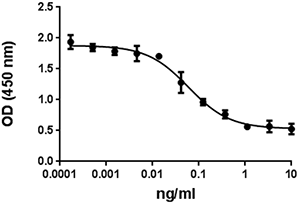
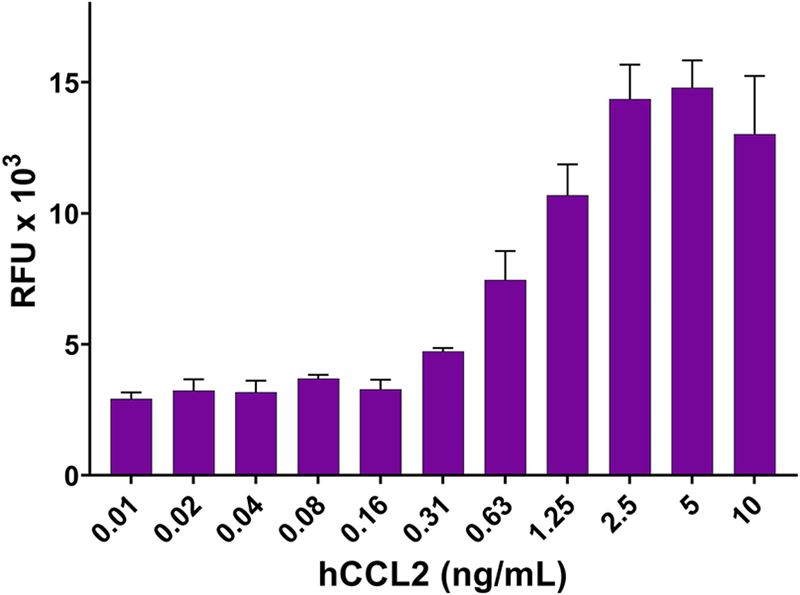
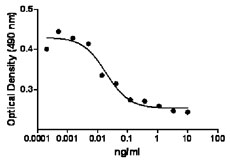
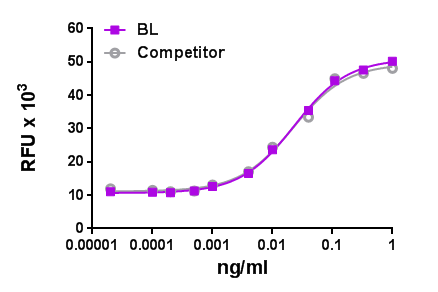



Follow Us